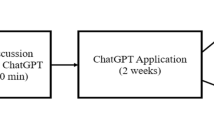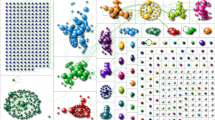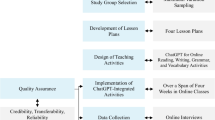Abstract
WHILE ADVANCES IN INSTRUCTIONAL TECHNOLOGY offer new ways to think about and teach in the humanities and the social sciences, inadequate attention has been paid to the teaching of linguistics and the employing of various pedagogical models within the classroom. By contributing entries to the California Central Coast Online Dictionary (CCCOD), a database-supported Web site, university students learn a great deal about linguistics and lexicography. Such a project allows for consideration of several models for teaching in the information age: teaching as modeling, teaching as negotiation, and teaching as defamiliarization or disequilibrium. Using instructional technological tools such as the CCCOD provides opportunities for students to consider real-world language challenges. By describing speech communities through the creation of an online dictionary, faculty and students share in multifaceted interactivity and collaborative learning.
Similar content being viewed by others
References
Arnheim, R. (1989).Visual thinking. Berkeley: University of California Polytechnic.
Battenburg, J.D. (2002). California central coast online dictionary. [Online]. Available: http://cccod.lib.calpoly.edu/
Bruner, J. (1986).Actual minds, Possible worlds. Cambridge: Harvard University Press.
Canine, K.M. (1993). Sneaking linguistics into the freshman comp classroom: Compiling a "Dictionary of Slang." In A.W Glowka & D.M. Lance (Eds.).Language variation in North American English: Research and teaching (pp. 369–379). New York: Modern Language Association.
Eble, C.C. (1989)College slang 101. Georgetown: Spectacle Lane.
————— (1986). Slang: Etymology, folk etymology, and multiple etymology.SECOL Review, 10, 8–16.
————— (1981). scenes from slang.SECOL Review, 5, 74–78.
Freire, P. (1970, rpt. 1998).Pedagogy of the oppressed. (Nyra Bergman Ramos, Trans.). New York: Continuum.
Fromkin, V. & Rodman, R. (1998).An introduction to language. (6th ed.) New York: Harcourt Brace.
Gates, E. (1997). A survey of the teaching of lexicography: 1979–1995.Dictionaries: Journal of the Dictionary Society of North America, 18, 79–95.
Gruber, H.E., & Voneche, J.J. (Eds.). (1995).The essential Piaget. H.E. Gruber & J.J. Voneche (Eds.). Northvale, NJ: Aronson.
Hanks, W.F. (1991). Foreword. In J. Lave & E. Wenger,Situated learning: Legitimate peripheral participation (pp. 13–24). New York: Cambridge University Press.
Holm, H-C. (1996). Alternate dictionary. [Online]. Available: http://www.notam.uio.no/~hcholm/altlang
Joseph, B.D. (1998). Linguistics for "everystudent."Studies in the Linguistic Sciences, 28(2), 123–133.
Kemmer, S. (1998). New words in English. [Online]. Available: http://www.owlnet.rice.edu/~ling215.
Laurillard, D. (1993).Rethinking university teaching: A framework for the effective use of educational technology. London: Routledge.
Lave, J., & Wenger, E. (1991).Situated learning: Legitimate peripheral participation. New York: Cambridge University Press.
Lazerson, M., & Wagener, U. (1999, January/February). Teaching and learning the unfamiliar.Change, 31, pp. 38–39.
Munro, P. (2001). UCLA slang 4.UCLA Occasional Papers in Linguistics. p. 22.
Ohio State University Linguistics Department. (2001).Language files. 8th ed. Columbus: Ohio State University Press.
Readings, B. (1996).The university in ruins. Cambridge: Harvard University Press.
Sanders, J. (2001). College slang research project. [Online]. Available:http://www.csupomona.edu/~jasanders/slang/top20.html
World Lecture Hall at the University of Texas at Austin. (2001). [Online]. Available: http://www.utexas.edu/world/lecture.
Author information
Authors and Affiliations
Corresponding author
Additional information
ABOUT THE AUTHOR
John D. Battenberg is Professor of English at California Polytechnic State University. Along with devoting considerable time and energy to creating online resources for teaching linguistics and American literature, he serves as the Coordinator of both the English M.A. Program and the TESL Program. He has worked as an U.S. AID consultant, Fulbright professor, and U.S. State Department Academic specialist. His publications are in lexicography, language policy and planning, and English language teaching. He has also delivered lectures and workshops in Europe, North Africa, and the Middle East on instructional technology in higher education.
Kathleen Margaret Lant is Professor of English at California State Hayward where she is Co-Director of Online Programs for the Division of Extended and Continuing Education. She served as Professor of English at California Polytechnic State University for 15 years and was College of Liberal Arts Instructional Technology Coordinator there as well. At California State Hayward, she plans and develops online programs, instructs faculty in the use of educational technology, and teaches the English and the Instructional Technology Departments. Her publications include works on Louisa May Alcott, Sylvia Plath, Tennessee Williams, Stephen King, Harriet Beecher Stowe, Charlotte Perkins Gilman, Kate Chopin, and instructional technology. Her edited collection on StephenKing—Imagining the Worst: The Representation of Women in the Work of Stephen King—was published in 1998. She is currently working on a book on traditional values and new technologies in teaching at the college level.
Rights and permissions
About this article
Cite this article
Battenburg, J.D., Lant, K.M. Teaching linguistics and lexicography with online resources. J. Comput. High. Educ. 14, 3–20 (2003). https://doi.org/10.1007/BF02940936
Issue Date:
DOI: https://doi.org/10.1007/BF02940936




